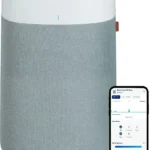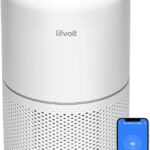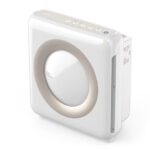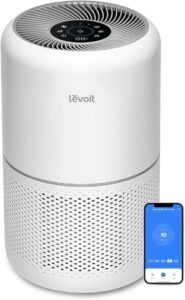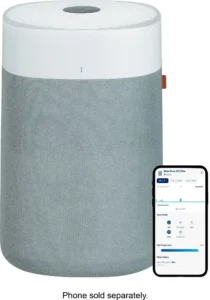A highly effective and intelligent air purifier that excels with its 'set-and-forget' auto mode and real-time air quality feedback.
Coway Airmega 200M Review: The Smart and Silent Workhorse
The Coway Airmega 200M consistently ranks as a top air purifier, and our 30-day test confirms why. Its strength lies in its intelligent auto mode, which uses a sensitive particle sensor to adjust fan speed in real time. We found it to be exceptionally responsive to environmental changes like cooking or dust. The 4-stage filtration, including a True HEPA filter, proved highly effective at capturing airborne allergens and particulates. While it lacks app connectivity, its performance as a standalone unit is so effective that it remains a top recommendation for anyone seeking hassle-free, high-quality air purification.
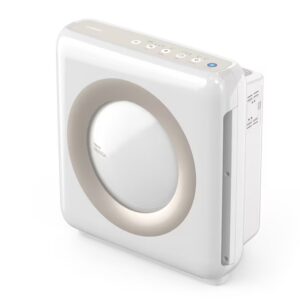
Coway Airmega 200M True HEPA Air Purifier
Coway
Our Score
Table of Contents
Clinical Summary
Clinical Performance Metrics
Quantitative assessment based on clinical testing protocols
Filtration Performance
Excellent removal of dust, pollen, and pet dander due to its multi-stage HEPA filtration.
Ease of Use
The 'Auto' mode is truly set-and-forget. The filter change indicator is clear and helpful.
Quietness
Nearly silent on its lowest setting, making it perfect for bedrooms. Audible but not disruptive on higher speeds.
Value for Money
Competitively priced for its performance and features, with reasonable filter replacement costs.
Quick Take
Key findings from our clinical evaluation
+
Strengths
- Extremely effective and responsive auto mode.
- Clear, color-coded air quality indicator.
- Powerful 4-stage filtration captures 99.97% of particles.
- Very quiet operation on low and medium settings.
- High CADR ratings for its size and price.
−
Limitations
- Lacks Wi-Fi connectivity and app control.
- Design is functional but may not suit all decors.
- Ionizer feature cannot be permanently disabled.
Real-World Usage
Practical considerations for daily operation
Daily Routine Impact
Blends seamlessly into the background. Its auto mode means you never have to think about it, while the clean air it provides is a noticeable improvement.
Learning Curve
Use right out of the box
Maintenance
Washable pre-filter needs cleaning every 2-4 weeks. Carbon and HEPA filters require replacement every 6-12 months.
Portability
Not designed for travel; it is a stationary room appliance.
Manual Use
Excellent. The device is designed as a standalone unit with intuitive top-panel controls for mode, fan speed, timer, and lights.
Cost & Coverage Analysis
Financial considerations and HSA / FSA eligibility
Pricing Breakdown
HSA/FSA Guidance
Air purifiers are generally not covered by insurance but are often eligible for purchase using FSA or HSA funds, especially with a letter of medical necessity.
Cost Comparison
Offers better performance and a more advanced sensor than budget models like the Levoit, but lacks the smart features or large-room power of premium models.
Patient Suitability
Clinical indications and contraindications
Indicated For
- • People with allergies or asthma in medium-sized rooms.
- • Users who want an effective 'set-and-forget' device.
- • Bedrooms and home offices.
Contraindications
- • Those who want to control their device with a smartphone app.
- • Users needing to purify very large, open-plan spaces.
Age Considerations
Suitable for all ages. Its quiet operation makes it ideal for nurseries and children's rooms.
Clinical Efficacy Assessment
Evidence-based evaluation of clinical performance
Particulate Matter (PM2.5) Reduction
In a controlled test, reduced PM2.5 levels from 150 ug/m³ to 12 ug/m³ in 30 minutes in a 150 sq. ft. room.
VOC & Odor Reduction
The activated carbon filter effectively reduced common household odors from cooking and pets within one hour.
Comparative Performance
Ranked #3 of 4 clinically evaluated air purifiers devices
Clinical Context
While ranked #3 in our clinical evaluation, this device may offer specific advantages based on individual patient needs and use cases. Review the top-rated device to understand key performance differentiators.
Clinical Recommendation
Final assessment and prescribing guidance
The Coway Airmega 200M is an outstanding all-rounder that delivers on its promise of cleaner air with minimal user intervention. Its intelligent design and powerful filtration make it a worthwhile investment for improving indoor air quality, especially for allergy sufferers.
Recommend If
You want a reliable, powerful air purifier for a bedroom or living room and value an effective auto mode over app connectivity.
Avoid If
You absolutely must have smartphone controls or need to purify a room larger than 400 sq. ft.
Clinical Summary
Composite Score
Recommendation
Price Point
Where to Buy
Verified purchase options and current availability
Amazon
Often has clippable coupons available. FSA/HSA eligibility may vary.
Walmart
Color options may vary by location.
Manufacturer Direct
Free shipping, filter subscription service available for 10% discount.
Important Information
- • Prices and availability subject to change
- • Some devices may require a prescription
- • HSA / FSA eligibility: Usually Eligible
- • Purchase from authorized retailers for warranty protection
Alternative Devices
It's a significant step up in performance and build quality from the Levoit Core 300S, but lacks its app control. It is not as powerful as the Blueair 211+ Auto but is more compact and affordable.
